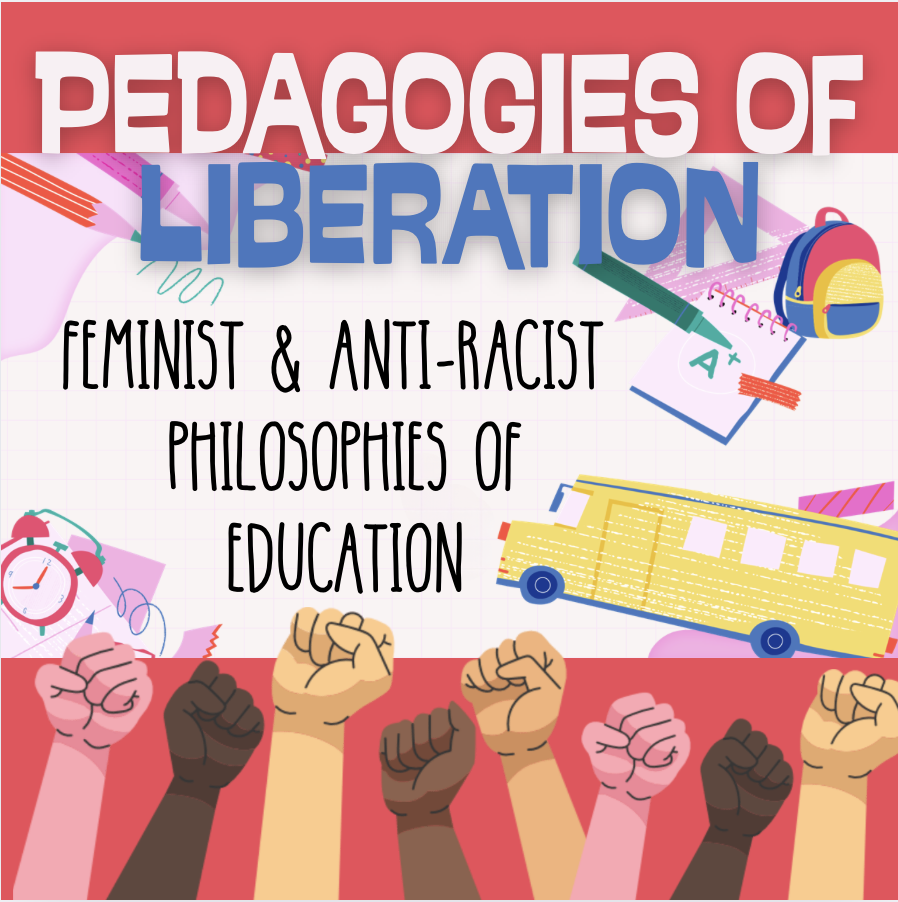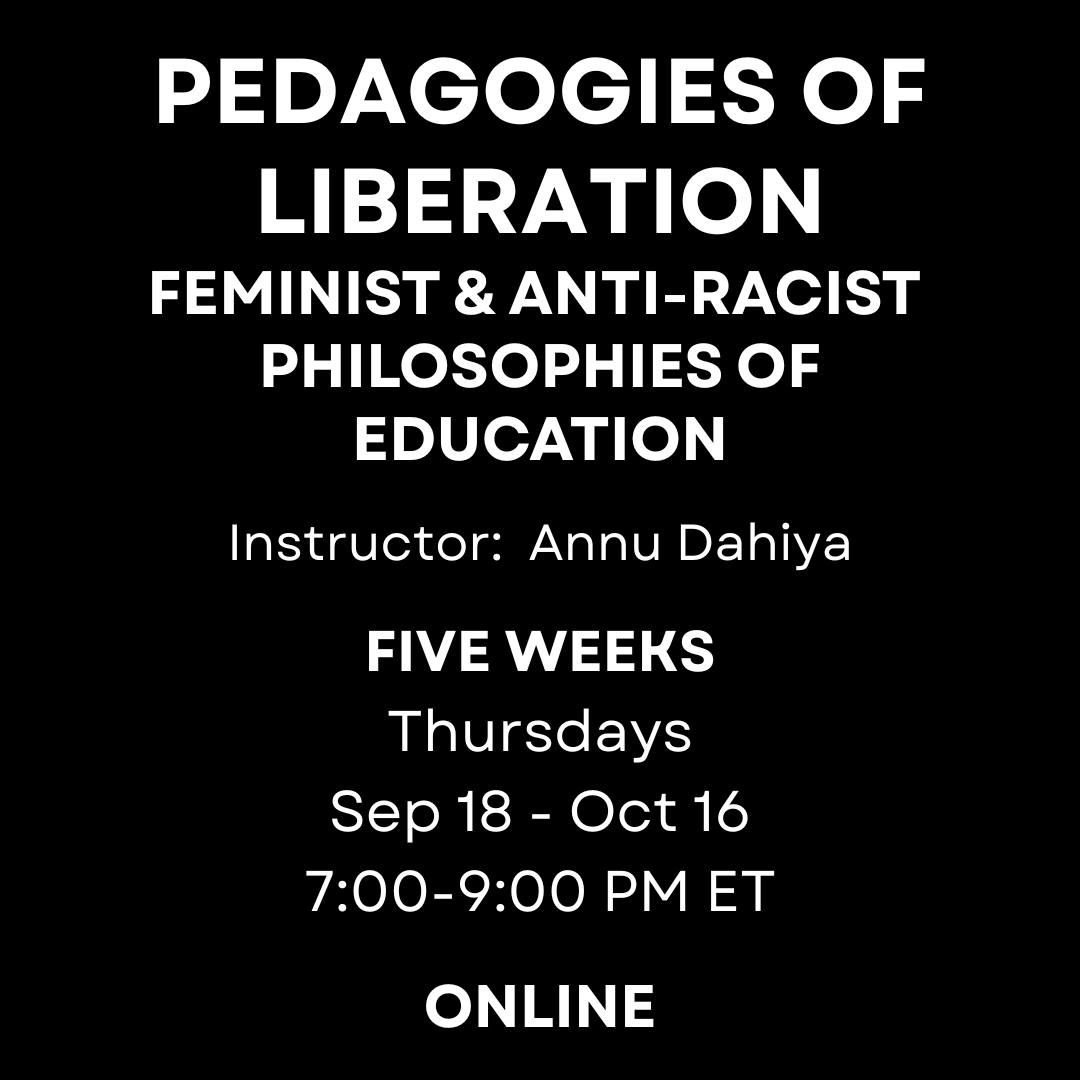 Image 1 of 2
Image 1 of 2

 Image 2 of 2
Image 2 of 2



Pedagogies of Liberation: Feminist and Anti-Racist Philosophies of Education [ONLINE]
Full Tuition: $340 — Sliding-scale options are available in the drop-down menu. To pay in installments, choose to pay with PayPal at check out.
Instructor: Annu Dahiya | 5-weeks | Thursdays September 18-October 16 | 7:00-9:00 PM | ONLINE
Education has increasingly become a contested space, but feminist and anti-racist thinkers have long called on us to critically examine the politics of education.They argue that what and how we’re taught can far too easily fall into (and reproduce) structures of domination. Many of our past and present experiences of schooling are structured around the passive transfer of knowledge from teacher to student, which the student is then expected to reproduce. How do the educational systems of our childhood inhibit critical thinking? What are the lifelong consequences of such inhibition? We begin with Paulo Freire’s Pedagogy of the Oppressed to explore the concept of “problem-posing” education, followed by bell hooks’ Teaching to Transgress: Education as the Practice of Freedom, engaging her idea that “to educate as the practice of freedom is a way of teaching that anyone can learn.” We will learn the difference between what Freire calls the banking model of education—in which teachers deposit information for students to receive, memorize, and repeat—and problem-posing education, which encourages people to “develop their power to perceive critically the way they exist in the world” and come to see reality as dynamic and transformable. Problem-posing education initiates the process of learning for liberation, as teachers and students become active co-creators of knowledge. This course challenges conventional ideas of education by asking broader questions about the nature of knowledge itself, the aims of education, and the evolving relationship between teachers and students. While the texts we study will guide those who teach and learn in formal settings, the course also invites us to reflect on how these ideas shape our lives more broadly. How can we harness these thinkers’ insights in our daily lives, our relationships, and our efforts to live more consciously and freely?
—
Recordings may be provided upon request for missed classes.
Sliding Scale: Night School Bar pays instructors and staff a living wage. We ask that people who make above the living wage threshold for their area strongly consider choosing the middle or full tuition tiers in order to support our own living wage program. For Durham, NC, where we are located, the living wage threshold is $49,000 for an individual. All scholarship needs are self-assessed, and we will never request or require proof of need.
Scholarships: We are currently able to offer three full scholarships per class. Our full scholarship tier is a nonrefundable offering, limited to one per student per month. Because our scholarship funding is limited, selecting multiple full scholarships in a single month will result in disenrollment from all classes. If the scholarship tier you need is sold out please email us directly one week before class begins, and we will offer you one at that time if additional scholarships become available. Please see our FAQ for more information, including installment plans and refund policy.
Asynchronous Auditing: Classes are discussion-based and designed to be taken synchronously. However, we do offer an asynchronous audit option for most online classes if you need to follow along at your own pace. You must choose the audit option to receive all course recordings; please do not register using a scholarship if you do not plan to attend the majority of class sessions as you will not receive the recording materials to follow along. We do not automatically offer scholarships for auditors, but if you need one, you may request one one week before class begins, and we will offer you one if we can make one available.
Full Tuition: $340 — Sliding-scale options are available in the drop-down menu. To pay in installments, choose to pay with PayPal at check out.
Instructor: Annu Dahiya | 5-weeks | Thursdays September 18-October 16 | 7:00-9:00 PM | ONLINE
Education has increasingly become a contested space, but feminist and anti-racist thinkers have long called on us to critically examine the politics of education.They argue that what and how we’re taught can far too easily fall into (and reproduce) structures of domination. Many of our past and present experiences of schooling are structured around the passive transfer of knowledge from teacher to student, which the student is then expected to reproduce. How do the educational systems of our childhood inhibit critical thinking? What are the lifelong consequences of such inhibition? We begin with Paulo Freire’s Pedagogy of the Oppressed to explore the concept of “problem-posing” education, followed by bell hooks’ Teaching to Transgress: Education as the Practice of Freedom, engaging her idea that “to educate as the practice of freedom is a way of teaching that anyone can learn.” We will learn the difference between what Freire calls the banking model of education—in which teachers deposit information for students to receive, memorize, and repeat—and problem-posing education, which encourages people to “develop their power to perceive critically the way they exist in the world” and come to see reality as dynamic and transformable. Problem-posing education initiates the process of learning for liberation, as teachers and students become active co-creators of knowledge. This course challenges conventional ideas of education by asking broader questions about the nature of knowledge itself, the aims of education, and the evolving relationship between teachers and students. While the texts we study will guide those who teach and learn in formal settings, the course also invites us to reflect on how these ideas shape our lives more broadly. How can we harness these thinkers’ insights in our daily lives, our relationships, and our efforts to live more consciously and freely?
—
Recordings may be provided upon request for missed classes.
Sliding Scale: Night School Bar pays instructors and staff a living wage. We ask that people who make above the living wage threshold for their area strongly consider choosing the middle or full tuition tiers in order to support our own living wage program. For Durham, NC, where we are located, the living wage threshold is $49,000 for an individual. All scholarship needs are self-assessed, and we will never request or require proof of need.
Scholarships: We are currently able to offer three full scholarships per class. Our full scholarship tier is a nonrefundable offering, limited to one per student per month. Because our scholarship funding is limited, selecting multiple full scholarships in a single month will result in disenrollment from all classes. If the scholarship tier you need is sold out please email us directly one week before class begins, and we will offer you one at that time if additional scholarships become available. Please see our FAQ for more information, including installment plans and refund policy.
Asynchronous Auditing: Classes are discussion-based and designed to be taken synchronously. However, we do offer an asynchronous audit option for most online classes if you need to follow along at your own pace. You must choose the audit option to receive all course recordings; please do not register using a scholarship if you do not plan to attend the majority of class sessions as you will not receive the recording materials to follow along. We do not automatically offer scholarships for auditors, but if you need one, you may request one one week before class begins, and we will offer you one if we can make one available.
Full Tuition: $340 — Sliding-scale options are available in the drop-down menu. To pay in installments, choose to pay with PayPal at check out.
Instructor: Annu Dahiya | 5-weeks | Thursdays September 18-October 16 | 7:00-9:00 PM | ONLINE
Education has increasingly become a contested space, but feminist and anti-racist thinkers have long called on us to critically examine the politics of education.They argue that what and how we’re taught can far too easily fall into (and reproduce) structures of domination. Many of our past and present experiences of schooling are structured around the passive transfer of knowledge from teacher to student, which the student is then expected to reproduce. How do the educational systems of our childhood inhibit critical thinking? What are the lifelong consequences of such inhibition? We begin with Paulo Freire’s Pedagogy of the Oppressed to explore the concept of “problem-posing” education, followed by bell hooks’ Teaching to Transgress: Education as the Practice of Freedom, engaging her idea that “to educate as the practice of freedom is a way of teaching that anyone can learn.” We will learn the difference between what Freire calls the banking model of education—in which teachers deposit information for students to receive, memorize, and repeat—and problem-posing education, which encourages people to “develop their power to perceive critically the way they exist in the world” and come to see reality as dynamic and transformable. Problem-posing education initiates the process of learning for liberation, as teachers and students become active co-creators of knowledge. This course challenges conventional ideas of education by asking broader questions about the nature of knowledge itself, the aims of education, and the evolving relationship between teachers and students. While the texts we study will guide those who teach and learn in formal settings, the course also invites us to reflect on how these ideas shape our lives more broadly. How can we harness these thinkers’ insights in our daily lives, our relationships, and our efforts to live more consciously and freely?
—
Recordings may be provided upon request for missed classes.
Sliding Scale: Night School Bar pays instructors and staff a living wage. We ask that people who make above the living wage threshold for their area strongly consider choosing the middle or full tuition tiers in order to support our own living wage program. For Durham, NC, where we are located, the living wage threshold is $49,000 for an individual. All scholarship needs are self-assessed, and we will never request or require proof of need.
Scholarships: We are currently able to offer three full scholarships per class. Our full scholarship tier is a nonrefundable offering, limited to one per student per month. Because our scholarship funding is limited, selecting multiple full scholarships in a single month will result in disenrollment from all classes. If the scholarship tier you need is sold out please email us directly one week before class begins, and we will offer you one at that time if additional scholarships become available. Please see our FAQ for more information, including installment plans and refund policy.
Asynchronous Auditing: Classes are discussion-based and designed to be taken synchronously. However, we do offer an asynchronous audit option for most online classes if you need to follow along at your own pace. You must choose the audit option to receive all course recordings; please do not register using a scholarship if you do not plan to attend the majority of class sessions as you will not receive the recording materials to follow along. We do not automatically offer scholarships for auditors, but if you need one, you may request one one week before class begins, and we will offer you one if we can make one available.